
The following is a list of some of the most recent collections to be processed at the University of Saskatchewan’s Archives and Special Collections. Note that this list is not comprehensive, but is meant to give a taste of some of the materials we are currently collecting, and which provide new research opportunities for our patrons. Subjects of interest are: Printed media personalities and literary figures; University history; John Diefenbaker; women’s histories; the Fabian Society; Northern studies (in co-operation with Russia); the performing and visual arts; AIDS, same-sex marriage and other LGBTQ+ issues; Indigenous justice; early rural life in Saskatchewan (particularly the Borden area); World War II; plant sciences. Also a fascinating array of rare signatures from historical figures have turned up this year, well worth checking out. E-mail ua.sc@usask.ca if you would like to explore any of these collections!
Art and Advertising Collection – MG 623: – 1926-2005 (inclusive); 1967-1998 (predominant). – 1.5 m of textual records (exhibition catalogues, posters, ephemera, and books), including oversize.
This collection consists of exhibition catalogues, posters, invitations and promotional ephemera, primarily (but not exclusively) from Canadian art galleries. The catalogues predominantly feature the work of Canadian artists, with some European and American artists (and minimal representation from Asian artists). The collection provides interesting documentation of the development of Canadian art across the country, including regional focus and to some extent, the development of interest in Indigenous art. In addition, the collection includes some auction catalogues, as well as items relating to advertising; art and design used in industry promotion; and industrial design.
Donna Bronson Scrapbook – MG 581 – 1926-1930 – textual records and ephemera, 14 photographs.
This scrapbook, “College Days,” contains materials collected by Donna during the years she attended university. Much of the material relates to student events, including initiation; banquets (“The New Girls’ Banquet given in honour of The Old Girls”); dances sponsored by Pente Kai Deka, Arts and Science, the Engineering Society, and the Literary Society. It also include various clippings about University faculty and students; some material relating to student elections (Sexton, Culliton, Mackenzie); the 1927 program for Varsity Follies; the 1926 commemoration service on November 11; class timetables, etc. Also included are original ink drawings, of a couple dancing, and of “Study Hour at Varsity,” as well as photographs of Donna and classmates “Mac” [Mary McLeary], Eleanor Knox, Winona Yager, and Hazel [?], as well as a group known as the “Swift Current gang.” Also included are samples of University stationery, a letter, song lyrics and college yells, various ads, including one for the Halfway House, etc.
Nils Clausson and Guy Michaud Collection- MG 620 – 1989-2017 (inclusive); 1989-1997 (predominant). – 5 cm of textual records; 2 o/s posters.
Nils Clausson served as Executive Director of AIDS Regina from 1987-1993. In 1989, he produced William Hoffman’s As Is, both as a fundraiser and to raise awareness of the AIDS epidemic, then often thought of as a “big city” problem. He continued with four other benefits over the next five years, with Guy Michaud directing the productions. Michaud had considerable experience as an actor, director, and playwright, in addition to working for CBC Radio-Canada. In October 1993, Clausson and Michaud co-founded Oscar Wilde & Company, a theatre group in Regina, the only gay theatre company on the Canadian prairies. Its primary mandate was to produce plays about AIDS and gay issues, as well as other important social and political issues. This collection contains materials related to AIDS Regina and the dramatic productions initiated by them as fundraisers / education. An outreach of that work was the formation of Oscar Wilde & Company. This collection includes scripts, posters, and programmes; and by extension documents the collaboration between Nils Clausson and Guy Michaud, who established the first gay theatre company in Saskatchewan.
Douglas and Novia Cole collection (additionals) – MG 369. – 1743-1994 (inclusive). – 20 cm of books and textual records.
Douglas and Novia Cole are residents of Saskatoon. This accrual adds to their collection of materials created by, or about, Canadian author Robertson Davies (1913-1995). Davies was editor of Saturday Night and the Peterborough Examiner prior to joining Trinity College, University of Toronto as professor of literature. The author of numerous plays and books, Davies is perhaps best known for The Salterton trilogy and the Deptford trilogy. He received both the Stephen Leacock medal for humour and the Governor General’s Award for fiction. Specifically, these items were from Davies’ personal library. Some of the items included correspondence or other material laid in, including a letter from Edmund Wilson (1895-1972; American writer, editor and critic), and a postcard from Thornton Wilder (1897-1975; American playwright and novelist).
Robert Cole fonds. – MG 368 (additionals) – 1919-2016 (inclusive); 2004-2016 (predominant). – 5 cm. of textual records.
Robert Cole earned his BA and MA from St. Thomas More College and the University of Saskatchewan, and his PhD from the University of Alberta. He currently works as Peel Bibliographer and Digital Content Coordinator at the University of Alberta Library. Previously, he served as a researcher and copy-editor for Chinook Multimedia in Edmonton. This accrual contains materials received primarily as a result of Bob Cole’s student days at the University of Saskatchewan and STM.
Lorne and Mabel Connell Family fonds – MG 600 – –1942-1979 (inclusive); 1951-1965 (predominant) – 45.72 cm of textual records, 19 photographs, 1 audio cassette, library, memorabilia and artifacts; plus oversize.
James Lorne Connell (1894-1965) was born in Manitoba; he enlisted in the CEF on 24 November 1915 (he was a dental student at the time). He married fellow dental student Mabel Gertrude Killins (1894-1963); they settled in Prince Albert, Saskatchewan where they both continued to practice dentistry. Mabel Connell served for a time on the Board of Broadcast Governors. This fonds contains materials relating to John Diefenbaker’s political career and personal friendship with the Connells; and in particular, reflects Diefenbaker’s career following his election as leader of the Progressive Conservative Party of Canada, and his constituency of Prince Albert.
Sophia Dixon– MG 224 – (2016 accession) – 1901-2012 (inclusive); 1940-1990 (predominant) -1.62 metres of textual records, 146 postcards, 79 photographs, 25 audio cassettes.
Sophia Rossander was born in 1900 in Denmark; her family immigrated to Saskatchewan in 1911. Despite a lack of formal schooling, in 1916 Sophia took her Grade 10 examinations, winning the Governor General’s Award. By 1917 she had completed Grade 11 and had taken three months of Normal School training in Saskatoon. Sophia worked as a teacher in rural schools for two years, then took courses in Business College in Regina prior to returning to teaching in 1920. At her school near Tramping Lake she met Charles Dixon, whom she married in 1921. Sophia was active in the early Grain Growers’ Association and other co-operative movements in Saskatchewan; and played an early and influential role in the Farmer-Labor Group, the CCF, the Saskatchewan Farmers’ Union, and co-operative marketing associations. This fonds contains materials created or accumulated by Sophia Dixon, and to a lesser extent, by her daughter, Jean Dixon Pettifor. It includes materials for memoir -biography project initiated by Sophia and later worked on by Jean, with help from other feminist academics. It contains much of Sophia’s writing (original documents and transcriptions); but also includes considerable material relating to her family.
Fabian Society Tracts Collection – MG 347 – nd, 1889-1935 (inclusive); 1889-1925 (predominant). – 15 cm of textual records.
The Fabian Society was founded in Britain in 1884, as a progressive movement characterised by a commitment to social justice, and increased equality in society. Many notable left-wing thinkers wrote tracts published by the Society, on topics relating to child labour, women’s suffrage, old age pension (1897), and working conditions; as well as encouraging democratic socialism and change through local government and trade unionism. Fabian pamphlets first proposed a national health service (1911), minimum wage (1906), and the Society is credited with helping to establish the modern welfare state. It’s members played a role in the formation of the British Labour Party in 1900; and were also involved in the creation of The New Statesman, and the London School of Economics, founded initially as a “research institute to provide proof positive of the collectivist ideal.” This collection contains 147 pamphlets, including some revised editions, organized by tract number; together with some annual reports.
Robert Finch fonds – MG590 – 10 cm textual materials; 40 black and white photos ; 51 negatives –1901-1946 (1933-1946 predominantly)
Correspondence from British emigrants describing their lives in Canada and concern over the war. The collection includes letters, photographs, negatives, manuscript drawings, maps, greeting cards, newsclippings, and one small watercolor.
Harald Finker fonds – MG 621 – Dates: 1986-2010 (inclusive). – Extent: 1.14 m: 4,940 photographs, 185 reprints/enlargements, 4 polaroids, 4,128 negatives, 3 internegs, 659 slides, 49 CDs
Harald Finkler formerly headed the Circumpolar Affairs Directorate of Indian and Northern Affairs Canada. Harald played a pivotal role in the Directorate’s longstanding contribution to Canada-USSR/Russia arctic cooperation achieved through technical assistance initiatives in building the capacity of the Indigenous Peoples of the Russian North. Since his retirement, he continues his polar engagement as consultant on northern and indigenous issues. This collection of images by H. W. Finkler, were taken of activities within the framework of Canada – USSR / Russia cooperation on the arctic. The subject matter follows the development of international relations, with an emphasis on the Chukotka Autonomous Okrug and particularly, Indigenous peoples of the north. The collection contains images of cities, towns, and herding camps; various officials from Canada and Russia; and numerous images of local people. It is an exceptionally comprehensive glimpse into the architecture, landscape, and daily lives of people in the Russian federation, over a period of roughly 20 years.
T.Y. and Judith Rice Henderson collection.- 2017-082 – [ca. 1994]-2017. – 0.6 m of textual records, 2 cds, 1 dvd
Judith Rice Henderson is a Professor of English and former associate dean at the University of Saskatchewan. T.Y. Henderson is a retired Professor of Philosophy at the University of Saskatchewan. Collection consists of programs from theater productions, but also music and dance and some special events. The collection primarily documents the performing arts in Saskatoon and area – notably Persephone Theater, Saskatoon Gateway Players and the Saskatoon Symphony – and includes representation from a number of independent theater companies, some no longer in operation. Internationally, there is an extensive set of programs from the United Kingdom, most extensively from London, Cambridge, and the Royal Shakespeare Company.
Mona Holmlund fonds. – MG 417 – 1996-1997 (inclusive). -20.32 cm of textual records; 60 audio cassettes.
Mona Holmlund earned her BA at St. Thomas More College, University of Saskatchewan; her MA at Reading University, and her PhD from Cambridge. She taught Art History at the University of Saskatchewan; and various courses on visual culture at Dalhousie University, where she holds appointments with the departments of History and Gender and Women’s Studies, and the Fountain School of Performing Arts; and is coordinator for the Certificate program in Art History and Visual Culture. This fonds contains materials relating to the publication of Women Together : Portraits of Love, Commitment, and Life ( essays by Mona Holmlund, photographs by Cyndy Warwick, foreword by Candace Gingrich. Philadelphia, Pa.: Running Press, 1999. In University library: HQ75.5 .H655 1999). The book was based on interviews with couples throughout North America, including those involved at the time with changes to legislation regarding same-sex marriages, etc.
The Hinde-Horn-Wake family fonds- MG604 – 1888-1998 (inclusive); 1910-1950 (predominant). – 0.4 m textual records; 6 photographs; 53 photographic negatives; memorabilia.
This fonds consists of records of the Joseph Hinde and Henry Wake families, members of an English Quaker community in Birmingham who immigrated to Canada in 1912. The records reflect their daily lives and the operation of the Hinde family’s Valley Springs Ranch near Borden, Saskatchewan. Materials relating to the Horn family farm at Spring Valley Saskatchewan during the Depression comprise the second series of records in this fonds. The types of records included are diaries, correspondence, photographs, financial records, publications, artifacts and clippings.
Reverend Joseph Holmes fonds – MG584 – 1875- 1967, Pre-1800 predom – 10 cm textual material
Reverend Joseph Holmes a Methodist minister in Exeter, Ontario. He was married to Lucretia (Cretia) Burke. He and his family travelled between churches in Ontario, and ultimately retired in Saskatoon around 1918. Two of his sons worked as dentists in Saskatoon, and his daughter worked for the Star Phoenix. This substantive family archive of Canadiana consists of multi-page correspondence for southern and south-central Ontario beginning in 1875 through 1929, but mostly pre-20th century, and comprises of several different threads of personal/familial writings with letters received between Saskatoon Saskatchewan, and many other locations across Canada. Along with the over 85 letters are some loose covers, an account book, one check book with stubs and perhaps another 20 pieces of ephemera.
C. Stuart Houston fonds- MG 164 – 1817 – 2017 (inclusive); 1950-2015 (predominant). – 7 m textual records; 1.4 m books; 456 photographs; 105 negatives; 15 35mm slides; 6 CD-R.
This accrual includes personal information on Stuart Houston, relating to his childhood in Yorkton, his secondary and postsecondary studies in the field of Medicine, and his family. Also included are his collected research and articles on birds, the environment, medicine, and history. A set of research files on persons related to all of these fields of interest is also included. Finally, materials related to Houston’s books in his Arctic Trilogy, 18th Century Naturalists of the Hudson’s Bay Area, Tommy’s Team, and 36 Steps on the Road to Medicare are included. Of particular note are an 1831 letter written by John Richardson, still with original wax seal, and hand painted drawings of birds of Chile.
Ian Innes fonds – MG 597 – n.d., 1915-1984 (inclusive); 1958-1984 (predominant). – 500 35 mm colour slides.
Ian Innes was hired by Colb McEown and Jim Wedgewood in July, 1958 and worked as a Planner and Architect for the University of Saskatchewan from 1958-1992. This fonds contains images depicting many of the building projects that were done during Innes’ years working on campus. They are not limited to buildings, but include available building sites, roads and walks, landscaping and some graphics. In addition, it includes images of other university campuses from around North America, and some from Europe.
Donald Cameron Kerr fonds – MG169- 1908 – 2017 (inclusive), 1940-2017 (predominant). -8.85 m, 786 photographs, 651 negatives, 15 35mm slides, 1 31/2” floppy, 5 CD-R, 23 cassette tapes, ephemera.
Donald Cameron Kerr was born in Saskatoon, Saskatchewan in 1936 and educated at St. Joseph’s School, Nutana Collegiate and the University of Saskatchewan where he received an Honours B.A. in English in 1958. He earned an M.A. in English at the University of Toronto in 1960. Kerr taught at the U of S from 1960 to 1962 and, after two years in London, U.K., from 1964 to his retirement. In addition to serving as acting chair of the department of English in 1985-86, Kerr has served on a number of departmental, college and university committees. This fonds reflects Kerr’s vocational and avocational interests. His academic activities include not only his own writing in a variety of genres but also his editing, assessment and review of the contributions of others to prose, poetry, drama and film. His service to the community external to the university is primarily evident in the political, arts and heritage fields.
Edward Alexander Maginnes-MG 611- 1903-1995 (inclusive); 1965-1983 (predominant). – 50 cm of textual records; 8 VHS tapes; 2 audio cassettes; 3118 35mm slides; 52 photographs.
Edward Alexander Maginnes was a Professor of Horticulture Science at the University of Saskatchewan. He remained there teaching and conducting research for 36 years, retiring in 2000. Areas that were of particular interest to him included Waste Heat Greenhouse Management, turf grass growth and maintenance as well as hydroponics growing methods. Ed was an honorary member of the Saskatchewan Turf Grass Association and the North American Lily Society. He was married to Beverly Maginnes in 1964, and the couple had three children (Elizabeth, Susan, and Sean). In his retirement, Edward was instrumental in the development and construction of an Abbeyfield House in Saskatoon. Edward passed away in 2010. The fonds is comprised of small press gardening publications and offprints collected by Maginnes, as well as videos on his subjects of interest. The largest segment of the fonds is Maginnes’ collection of 35mm slides, which feature lecture slides and images related to his greenhouse work, images of his sabbatical trips to Denmark, Sweden, and Japan, and personal family images.
R.N.G. Marken fonds -MG 187 – 1972-2017 (inclusive). – 20 cm of textual records.
Ronald Norman George Marken joined the English department at the University of Saskatchewan in 1966 as an instructor and was granted tenure as professor in 1980. He has served as Head of the department as well as acting head of the department of Native Studies. Marken has received a number of awards in recognition of his teaching prowess. In addition to literature and composition courses, Marken has taught modern drama and British poetry. He has published a number of poems, including collections entitled Cycles of Youth & Age and Dark Honey, articles and reviews pertaining to drama productions and monographs, edited The Easterner’s Guide to Western Canada and co-authored 1919: The Love Letters of George and Adelaide, which was subsequently presented by Regina’s Globe Theatre as “Dancing in Poppies” and “Flights of Angels” presented by Saskatoon’s 25th Street Theatre. Marken has also presented a number of academic papers and popular addresses to audiences at home and abroad.As part of his academic duties, Marken has served on a variety of committees at the departmental, college and university level. He is an active member of a number of professional organizations is involved with several community groups. These two additional accessions contains correspondence, teaching and research material and fiction and non-fiction writings by Marken.
Don McGuire fonds – MG 613 – nd, 1981-2015 (inclusive) -5 cm of textual records, memorabilia.
Don McGuire has been an advocate for the LGBTQ community in Regina, and nationally. As a practicing Catholic, McGuire has been particularly strong advocating within the Catholic church; and has also been active within Dignity Canada Dignité, “an organization of Gay Catholic men and women and other concerned people” providing a “positive communal ministry to gay people.” This fonds contains materials relating to the history and work of Dignity Canada Dignité, McGuire’s published letters and other correspondence, together with articles and materials outlining the debate within the Catholic church (echoed within other Christian denominations) regarding homosexuality.
Patricia Monture fonds – MG 539 – 1960-2010 (inclusive); 1980-2005 (predominant). – 5.6 m of textual records; 8 color photographs; 10 35mm slides; 2 CD-ROM; 16 VHS tapes; 2 DVD; 1 artifact.
Patricia Monture (later Monture-Angus) was a member of the Mohawk Nation from the Six Nations Grand River Territory. In 1988 she filed a suit in Ontario’s Supreme Court arguing that as a member of a sovereign nation, she should not be required to take an oath of allegiance to the Queen in order to join the Ontario Bar. In response, the Law Society made the oath-taking optional. Monture taught law at both Dalhousie University and the University of Ottawa before being offered a position in the Department of Native Studies at the University of Saskatchewan in 1994. She was granted tenure in 1998 and obtained full professorship in 1999, and was during this period one of very few Indigenous women in a faculty position on campus—at one point being the only Indigenous person in the Department of Native Studies. In 2004 she joined the sociology department and became the academic coordinator of the Aboriginal Justice and Criminology Program (also known as the Indigenous People and Justice Program). Her work on Indigenous and women’s rights stretched far beyond her activities on campus, and she served on a number of major inquiries including the Royal Commission on Aboriginal Peoples, the task force on federally sentenced women, and the task force on the use of solitary confinement in federal prisons. She passed away at the age of 52 in 2010.This fonds includes materials relating to Patricia Monture’s teaching, research, and professional activities on campus, as well as an extensive collection of materials relating to Indigenous rights, women’s rights, Indigenous women’s rights, the Canadian justice system, and how the Canadian justice system interacts with Aboriginal, female, and Aboriginal female offenders. The papers also explore issues of child welfare and domestic violence. A number of legal documents are included, as are materials relating to Indigenous self-governance, treaties, and the Indian Act. Also included are materials relating to Monture’s involvement in a number of national commissions including the Royal Commission on Aboriginal Peoples, the task force on federally sentenced women, and the task force on the use of solitary confinement in federal prisons. Through Monture’s correspondence, it is possible to get a sense of what it was like working as an Indigenous woman in academia during this period.
Maude Palmer fonds – MG588 – 1924-1933 – 5 cm textual records
Mrs. Maude Palmer of Aylmer Ontario had landholdings in Griffiths and Colgate Saskatchewan, managed from afar by her agent John Leonard. A number of letters dealing with the management of Mrs. Palmer’s landholdings and agricultural operations there during the early years of the Great Depression.
E. Priest fonds – MG587 –1881-1885-1 journal
E. Priest of Carnarvon, England was a teacher and governess until her marriage to Mr. Edward Jones, whereupon the couple immigrated to Canada, beginning their own homestead in Moosomin Saskatchewan. Her sister opened the first school in Moosomin. This diary spans four eventful years of Ms. Priest’s life, touching on her activities as a teacher, her wedding, holiday trips to England and Wales, and early years homesteading in Canada. Personal and philosophical thoughts are also explored within the diary. Many flowers are pressed in the diary.
Jack Quinlan fonds. – MG 593. – nd, 1935-1953 (inclusive); 1938-1944 (predominant). – 3 cm of textual records, 31 photographs, memorabilia.
John Michael (“Jack”) Quinlan was born on 28 July 1915, in Prince Albert, Saskatchewan. His father, a bank accountant and manager, moved the family frequently: Jack’s elementary education was taken in Melfort, Winnipeg and “points west;” but in the 1930s the family moved to Prince Albert, where they remained. Quinlan worked for the Bank of Nova Scotia and in 1935, passed his examinations to become an Associate of the Canadian Bankers’ Association (Queen’s University), and worked for the PA Herald prior to attending the University of Saskatchewan, where he obtained both a BA and LL.B (1941). Upon graduating, he immediately joined the Royal Canadian Air Force. After a training course in PEI Quinlan was stationed in England; in early 1944 he was sent to North Africa. He died on 4 March 1944. This fonds contains materials relating to the life of Jack Quinlan. It includes photographs of his years as a student at the University of Saskatchewan, but predominantly reflects his time with the RCAF. It is notable for the letters of condolence sent to his family following his death, which provide clear evidence of the extent to which one family’s loss was felt throughout the community.
Bruce Reeder fonds – MG576 – 20 cm textual records; 46 35mm slides (glass and cardboard); 12 8x10cm glass slides; 275 negatives –1956-2001
Bruce Reeder spent many years working for the School of Public Health at the University of Saskatchewan. He is now a Professor Emeritus of Community Health and Epidemiology. His areas of research are Global Health, infectious disease, the prevention of obesity and cardiovascular disease, and complex adaptive systems and systems thinking. In the 1990’s, he worked for Health Canada, and was involved in the Canadian Heart Health Initiative. He has also been a leader in the One Health initiative.
Clarence White Rife fonds – 1872, 1910, [ca. 1940s]. – 3 cm of textual records, 1 photograph.
Clarence White Rife graduated from the University of Saskatchewan with a BA in history and political science (1914), and spent 1915-1917 as a teacher in Swift Current, Saskatchewan before pursuing his MA from the University of Toronto (1918). He spent 1918-1919 as a sessional lecturer at Queen’s University prior to enrolling at Yale, from which he earned his PhD in 1922. He then began his career as professor of history at Hamline University in St. Paul, Minnesota. By 1927 he became chair of the department, a role he continued for nearly thirty years. He retired in 1956 and was named professor emeritus. Rife co-founded the Hamline University Institute of World Affairs, served as financial director for the Minnesota Student Project for Amity Among Nations (SPAN), was an active member of the Ramsey County Historical Society, and was active in the Hamline Methodist Church, serving as chair of its Historical Committee. This fonds contains Rife’s diary for 1910, the year he decided to lease his homestead and pursue a degree at the University of Saskatchewan. A book owned by his father, George Rife, documents the area of Pennsylvania where Rife family were before they emigrated to Canada. Notes by Rife’s daughter provide context and additional information.
Ross Family Autograph Album – MG 598 – [ca. 187-?] – 1981 (inclusive); [187-?]-1915 (predominant). – 5 cm of textual records. Album: 110 pages, approximately 362 autographs; 5 letters; clippings and ephemera.
This album contains over 360 autographs from prominent individuals of the time, including six Prime Ministers (all those who served between 1878-1911); eight Governors-General; 25 cabinet ministers; and over 100 members of parliament, predominantly those who served in the first 10 parliaments between 1867 and 1905. Other individuals of achievement and/or fame in various fields are also represented: scientists; public officials from other countries; diplomats; religious leaders; those in the performing arts. Uniquely, the album also contains several signatures from members of the Royal Family: extremely rare in an album of this kind. This album was initiated by Jessie Flora Ross (1839-1937) and maintained by three generations of the Ross family. Some of the entries have specific references to Donald, her son; it is his name in the frontispiece. Donald’s son, Arthur Dwight Ross (1907-1981) and his wife Marguerite Wynn (1908-2003) also encouraged prominent people of their day to sign.
Vipen Sawhney fonds – MG 509– 2017-081. – 1979-2016. 0.80 m. of textual records.
Vipen Sawhney came to the University of Saskatchewan in 1975. Dr. Sawhney rose through the ranks serving as the Rawson Professor of Biology and Department Head from 2003-2007. In addition to his U of S appointment, he has been a visiting Professor and Fellow several times. Dr. Sawhney maintained a first rate research program throughout his career, co-editing a book and authoring more than a hundred refereed papers. He is an internationally recognized plant geneticist focusing on understanding the processes and mechanisms controlling flower and pollen development in angiosperms using floral and male-sterile mutants in tomato, canola and Arabidopsis. By using microscopic, physiological and proteomic approaches, Dr. Sawhney has investigated the various factors, and their possible interactions, in plant developmental processes. His research on male sterility in tomato has been applied in the hybrid seed industry. He has received many awards and honours including the Master Teacher 2007, Earned Doctor of Science 2010 and the Award of Innovation from the University of Saskatchewan. He served as the President, Canadian Botanical Association, 2004-2006, President, International Association of Sexual Plant Reproduction and Research, 1998-2002 and Vice-President, Canadian Botanical Association, 1998-1999.
Jason Schoonover fonds – MG 583 – 1975 (predominant); 1957-1977 (inclusive). – 10 m of textual material; 25 photographs; 4 audio reels; 3 film reels; 1 audio cassette; 1 45 rpm record.
“Writer, adventurer, expedition leader, ethnologist, archaeologist, paleontologist, canoeist, naturalist, photographer and Fellow Emeritus, Stefansson Medalist, Citation of Merit awardee, and on the Honor Roll of the prestigious Explorers Club—was brought up on farms, and in villages and small towns in Saskatchewan, Canada, and cities like Saskatoon and Vancouver. This explains why he feels equally at home canoeing in the remote north of his homeland, one of his passions, and living in mega-cities like Bangkok. Following university, he launched a multi-media career as a disk jockey, and expanded into writing, directing and producing in radio, TV, stage, newspapers and magazines, including stints as a columnist. His largest stage production was writing, directing and producing Prime Minister John Diefenbaker’s 80th birthday party gala in 1975, an extravaganza involving over 300 performers and personnel”: (from Jason Schoonover’s website ) This fonds contains textual materials and audiovisual materials pertaining to the writing and planning of Diefenbaker’s 80th Birthday Party in 1975. Specifically it includes handwritten and typed notes, correspondence, photographs, audio visual reels, and some clippings.
Shirley Serviss fonds-MG 617 – nd, 1975-1992 (inclusive). – 2 cm of textual records; 1 photograph.
Shirley Serviss is an author and poet. She was raised on a farm near Ethelton, Saskatchewan attended the University of Saskatchewan in 1971-1972, and took art classes from Reta Cowley. While working as a journalist for the Prince Albert Daily Herald, Serviss met John Hicks. Serviss earned her BA in creative writing from the University of Alberta, and her MA in theology from St. Stephen’s College (1997). She and Alice Majors started Roland Books; and she taught at MacEwan University. Serviss was a founding member of the Writers Guild of Alberta. This fonds contains correspondence from Reta Cowley, and John Hicks. The Cowley correspondence in part, discusses her painting process; and the Hicks correspondence discusses the Saskatchewan writing scene (particularly Prince Albert); his publications and awards, and his ideas about writing.
Joseph and Stella Skwara Farming History fonds. – MG 596- 1911-2012 (inclusive); 1950-2012 (predominant).- 40 cm of textual records.
Joe and Stella married in 1945, and together they farmed in the Borden area from 1945 to 1983. They had two daughters. Joe and Stella retired to Borden in 1983, where Joe died in 2005. Stella died in 2012. The Skwara farm near Borden, Saskatchewan, has remained in the hands of a single family for over 70 years. The majority of that period – over 60 years – is documented in this fonds. In particular, as farmers such as the Skwaras are self-employed, details in income tax and Canadian Wheat Board permit books provide considerable insight into the changing nature of farming practices and the economic reality of farming over time. Blacksmithing costs; beekeeping; the nature of the crops being grown; diversification through livestock; cost (and availability) of transient help; and the number of acres under cultivation all combine to tell not only the personal story of one farm family, but also farming as a business.
The Walter Slipchenko fonds.- MG 599 – 1930-2010 (inclusive); 1970-1995 (predominant)- 5.28 m of textual records, library, 1,304 slides, 231 photographs, 10 internegs, 1 disc; website
Walter Slipchenko was born in Winnipeg in 1934 and grew up in that city. He attended the Canadian Military College at Royal Roads, Victoria, BC, and the Royal Military College (RMC), Kingston, ON, becoming an officer in the Royal Canadian Engineers. Upon leaving the military, he graduated from the University of Manitoba with a Masters in Arts in 1966 before joining the federal public service in Ottawa. Walter had a distinguished 35-year career in the public service within the Department of Indian Affairs and Northern Development and the Government of Northwest Territories, focused on Aboriginal affairs and Canada’s circumpolar relations. He was instrumental in developing Canada’s cooperation with other circumpolar states, and nurturing agreements with Russia on the Arctic. He was unwavering in his support of Indigenous peoples throughout the circumpolar world. [Sources: obituary, and material supplied by Andrew Slipchenko and Harald Finkler]. This fonds contains materials created or accumulated by Walter Slipchenko during his career and during research for his definitive report, Canada’s Arctic Cooperation with the Soviet Union and Russia, 1965-2000. The documentation is comprehensive, covering a number of subjects and organizations, and provides a valuable record of circumpolar life across several nations. In addition to the physical items, it includes a website, www.walterslipchenko.com which provides further information on the scope of the report and the development of international, circumpolar relationships.
Duff Spafford- MG 281. – 1908-2015. – 2015-098; 2017-045. – 3.4 m.
Duff was a member of faculty at the University of Saskatchewan for over 40 years. He started in the Department of Economics and Political Science, where he taught both economics and political science. When the department separated in 1985, he took the option of joining the new Department of Political Studies. His research interests included public finance, economic development, and Saskatchewan history. After shifting to political studies, his primary interests were election systems, representation, and the mathematical relationship between seats and votes. After Duff retired in 2002, he was active in the University of Saskatchewan Retirees Association and the College and University Retirees Association. He was passionate about the university and scoured primary sources to record the achievements of its alumni, in the process discovering forgotten students of critical importance to the history of the institution. This fonds includes material relating to Duff’s University of Saskatchewan research interests, including Frank Anderson, the Ceramics Department, books written by alumni, teaching and department files, consulting and The Sheaf.
David Williams – MG 453
David Larry Williams was born 22 June 1945 at Souris-Glenwood, Manitoba. He earned and Pastor’s Diploma from Briercrest Bible Institute in 1965, a BA from the University of Saskatchewan in 1968 and a MA and PhD from the University of Massachusetts in 1970 and 1973. He joined the faculty of the University of Manitoba in 1972 where he has taught classes in the Canadian Novel, Seventeenth-Century British Literature, Literature Since 1900, Media and Memory, Media and Nation, Milton, Milton & the Levellers and Contemporary Critical Theory. His major works include. Media, Memory, and the First World War; Imagined Nations: Reflections on Media in Canadian Fiction; Confessional Fictions: A Portrait of the Artist in the Canadian Novel; The River Horsemen; Eye of the Father; and The Burning Wood. Williams’ novels recreate the world of his childhood in rural Saskatchewan exploring the competing mythologies of the people who came to settle the region. His literary criticisms explore the place of Canadian literature within the wider field of modern literature written in English.
MG 216 – RG Williamson – 2017 accessions. – 1952-2009 (inclusive); 1977-2002 (predominant). – 0.81 metres of textual records.
While wintering at Ft. Simpson, Northwest Territories, Robert Gordon Williamson began recording Dené folklore as an independent initiative. Williamson’s extensive record of scholarship in cultural anthropology and ethnology can be dated from this period forward. Between July 1953 and October 1954 while based at Pangnirtung, Baffin Island, he learned Inuktitut and extended his ethnological experience by travelling throughout Cumberland Sound. During the summers while working toward his first degree, Williamson was employed with the Department of Northern Affairs. In 1958 he joined the Department of Northern Affairs on a full-time basis, where he established their Eskimology section, founded the first Eskimo language journal, and became Welfare and Rehabilitation Superintendent for the district of Keewatin, dealing primarily with social issues. His career with the University of Saskatchewan began at the Centre for Community Studies, with a study of Fringe Saulteaux near Kamsack, Saskatchewan; by 1964 he had joined the department of Anthropology as a lecturer and was an associate director with the Institute for Northern Studies. In addition, Williamson served for over a decade as the director of the University’s Arctic Research and Training Centre. In 1966 he was elected by acclamation in the first of his two terms as member for Keewatin to the Legislative Council of the NWT. Williamson has worked on behalf of numerous organizations, including the Inuit Tapirisat of Canada, the Canadian Eskimo Arts Council, the Inuit Circumpolar Conference, and the CBC Northern Service. He was invested into the Order of Canada in 1983. Upon his retirement from the University in 1999 Williamson was named Professor Emeritus, and at the fall 2000 convocation ceremony, was recognized with the JWG Ivany Internationalization Award. This final accrual to the Williamson fonds documents Dr. Williamson’s work relating to the Canadian north and other circumpolar regions. It includes his memoirs; and in particular documents some of his later research work, notably that relating to the Distant Early Warning (DEW) Line.
Grant Wood fonds – MG 609 – 1956-2005 inclusive – 20 cm textual
Grant Wood worked for many years in Agricultural Extension at the University of Saskatchewan, and upon the closure of that Department became an Assistant Professor in the College of Agriculture and Bioresources in the Department of Plant Sciences. Wood has been a driving force behind the University’s rooftop gardens and other urban agricultural initiatives, and specializes in teaching urban agriculture, a course he developed to help students understand why we should be growing more food locally. He has acted as faculty advisor to the U of S horticulture club, and is also involved in various food-growing initiatives off-campus, frequently working with new Canadians, and sharing his love of urban farming. He has also been involved with “The Gardener for the Prairies” magazine, and donated many copies to our Special Collections. This fonds contains materials relating to the professional activities of Grant Wood, including papers he has presented at conferences, and his work in the Canada Mongolia Training for Rural Development Project. Also included are some of his early teaching materials, and materials collected on subjects related to his field.
Woolsey Family Collection MG585 – 1943 – 1944 –1 file
Two of the letters in this grouping were written by V-10860 Telegrapher Leonard R. Woolsey, who was an original member of the crew of the HMCS Athabaskan, which was disabled by German air attack in August 1943. He later served at sea in H.M.C.S. Chaudiere, and finally received a commission, ending the war attached to the Royal Navy as a Fleet Air Arm fighter controller. The other correspondence was written by his mother, and include content about the early service of the Athabaskan, and about her sinking in 1944. The letters were written to Leonard’s brother L.A.C. Eldon Woolsey, R-120650, who served overseas in the R.C.A.F. from 1943 to 1945, much of the time with 422 Squadron. [Two other brothers, Donald, served in the Canadian Parachute Corps late in the war and Able Seaman Boyd H. Woolsey, who served at sea on anti-submarine duties in Fairmile motor launches.]
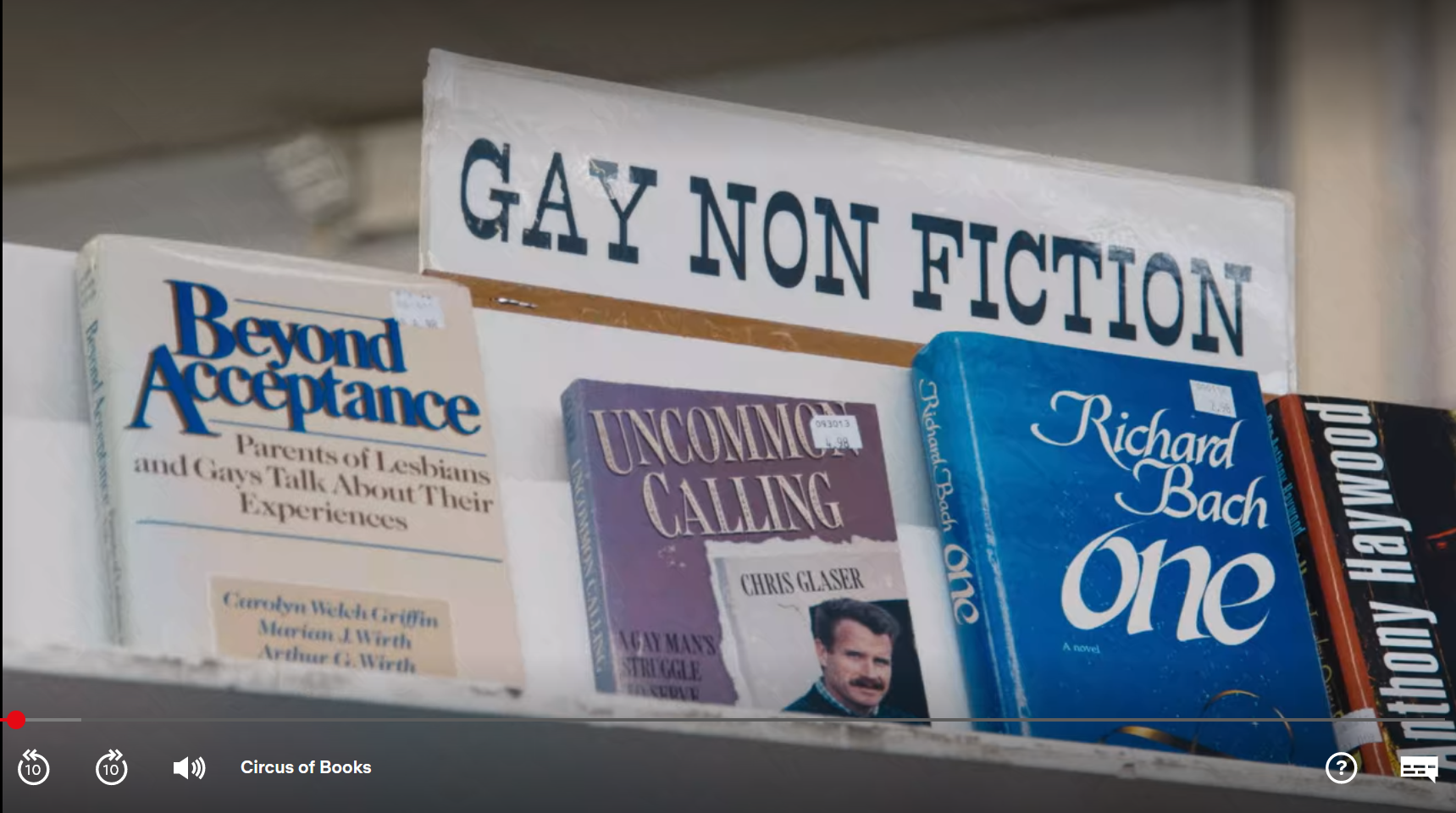 Beyond Acceptance is available in the main stacks of the Murray Library. The Neil Richards Collection also carries an extensive non-fiction selection on topics such as religion, history, politics, art, self-help, health, and more.
Beyond Acceptance is available in the main stacks of the Murray Library. The Neil Richards Collection also carries an extensive non-fiction selection on topics such as religion, history, politics, art, self-help, health, and more.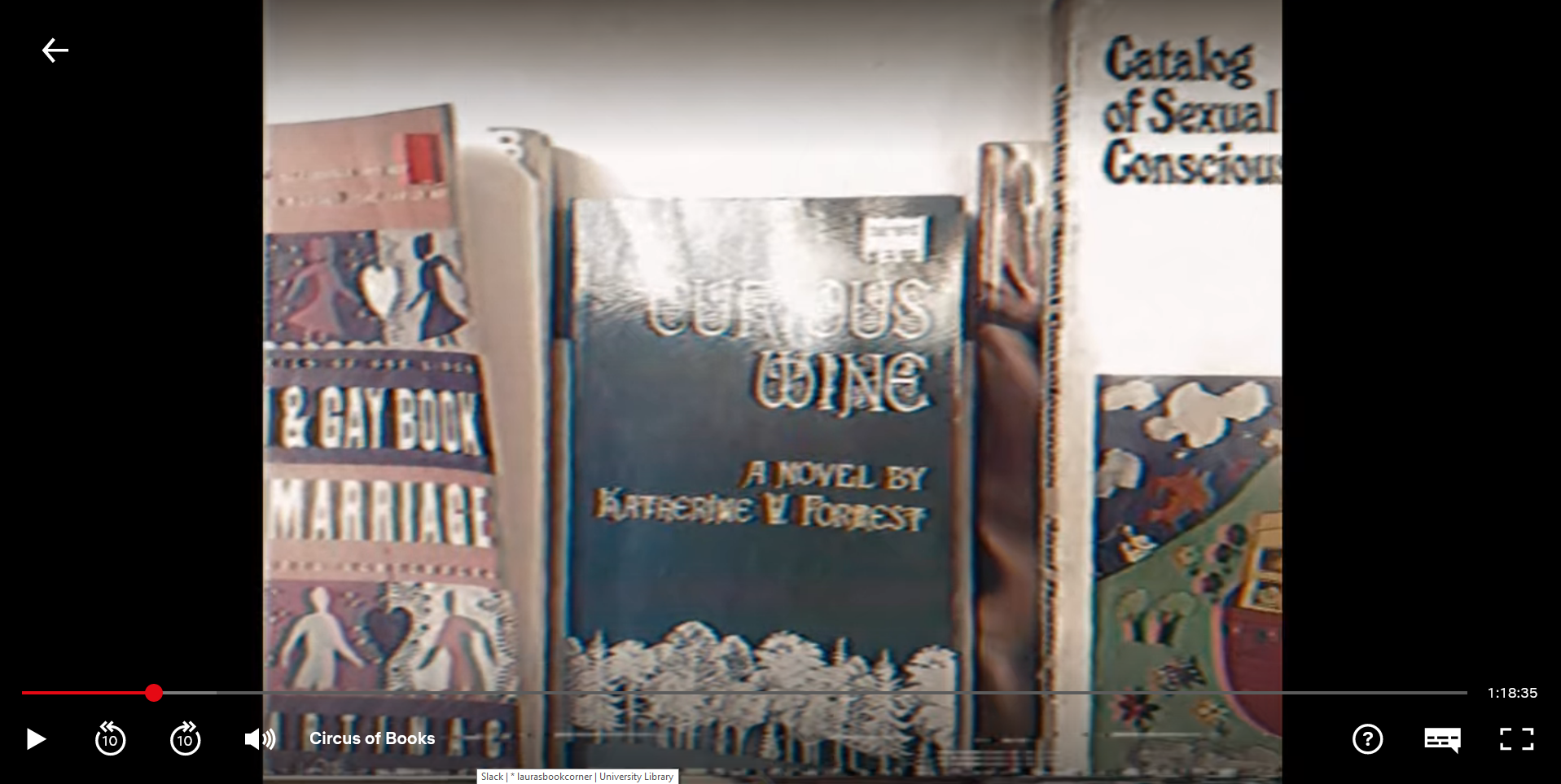 The Neil Richards Collection is also home to a wide variety of fiction – from classics, to contemporary, erotic and non-erotic, popular fiction, pulp fiction, and everything in between – as long it is has ties to LGBTQ issues, whether in it’s themes, characters, or authorship.
The Neil Richards Collection is also home to a wide variety of fiction – from classics, to contemporary, erotic and non-erotic, popular fiction, pulp fiction, and everything in between – as long it is has ties to LGBTQ issues, whether in it’s themes, characters, or authorship.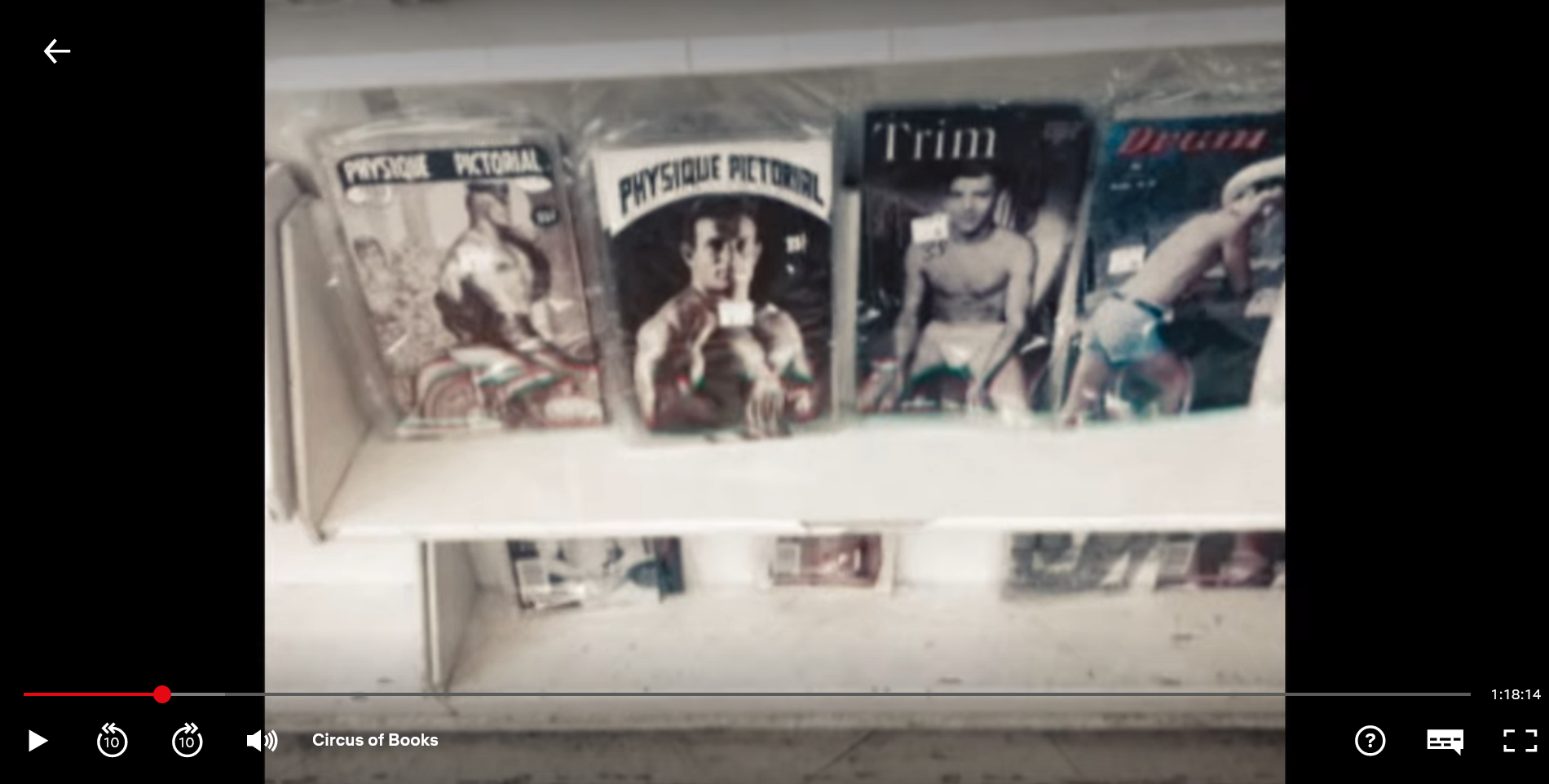 Physique magazines were the precursor to modern gay magazines, popular around 1940-1960. Styled as magazines about bodybuilding, health, and fitness, they were a way to try to get around censorship and the cultural taboo of homosexuality.
Physique magazines were the precursor to modern gay magazines, popular around 1940-1960. Styled as magazines about bodybuilding, health, and fitness, they were a way to try to get around censorship and the cultural taboo of homosexuality.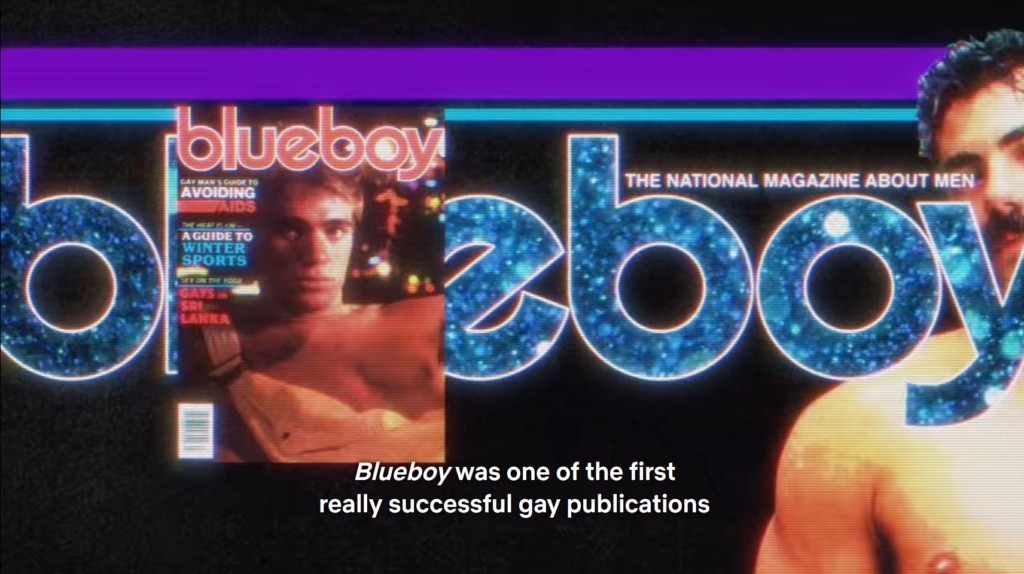 “Blueboy was one of the first really successful gay publications that was not underground” says Larry Flynt (interviewed in the documentary). Flynt was the publisher of Hustler Magazine, who also took on the distribution of gay publications such as Blueboy, Honcho, and Mandate.
“Blueboy was one of the first really successful gay publications that was not underground” says Larry Flynt (interviewed in the documentary). Flynt was the publisher of Hustler Magazine, who also took on the distribution of gay publications such as Blueboy, Honcho, and Mandate.
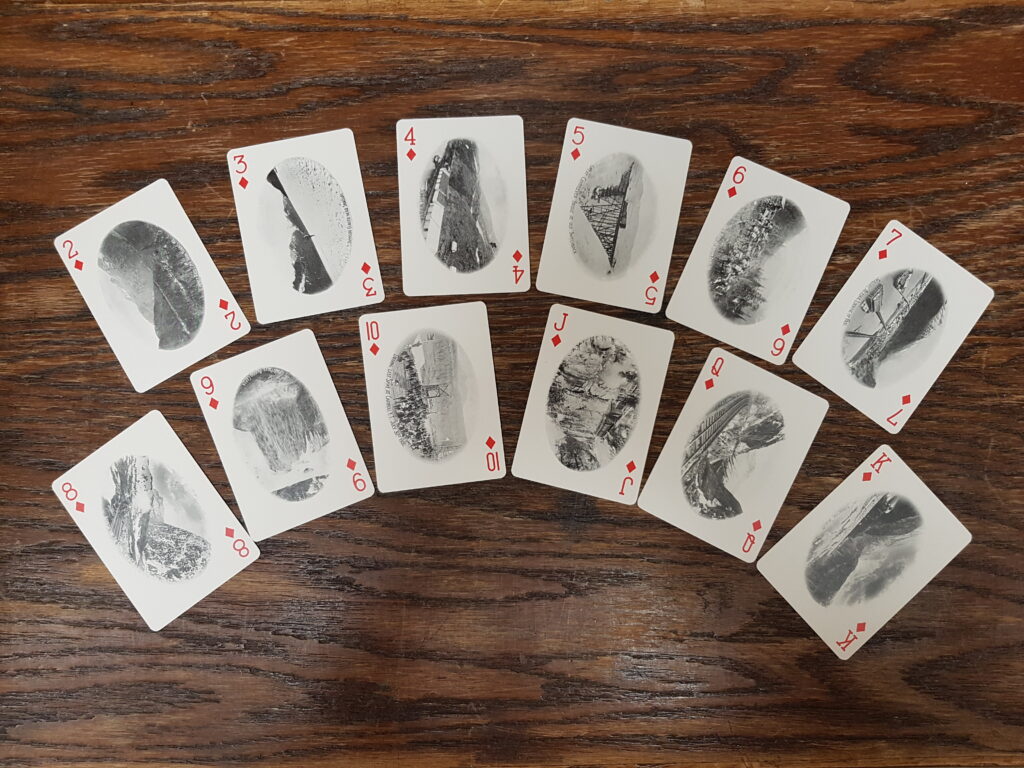
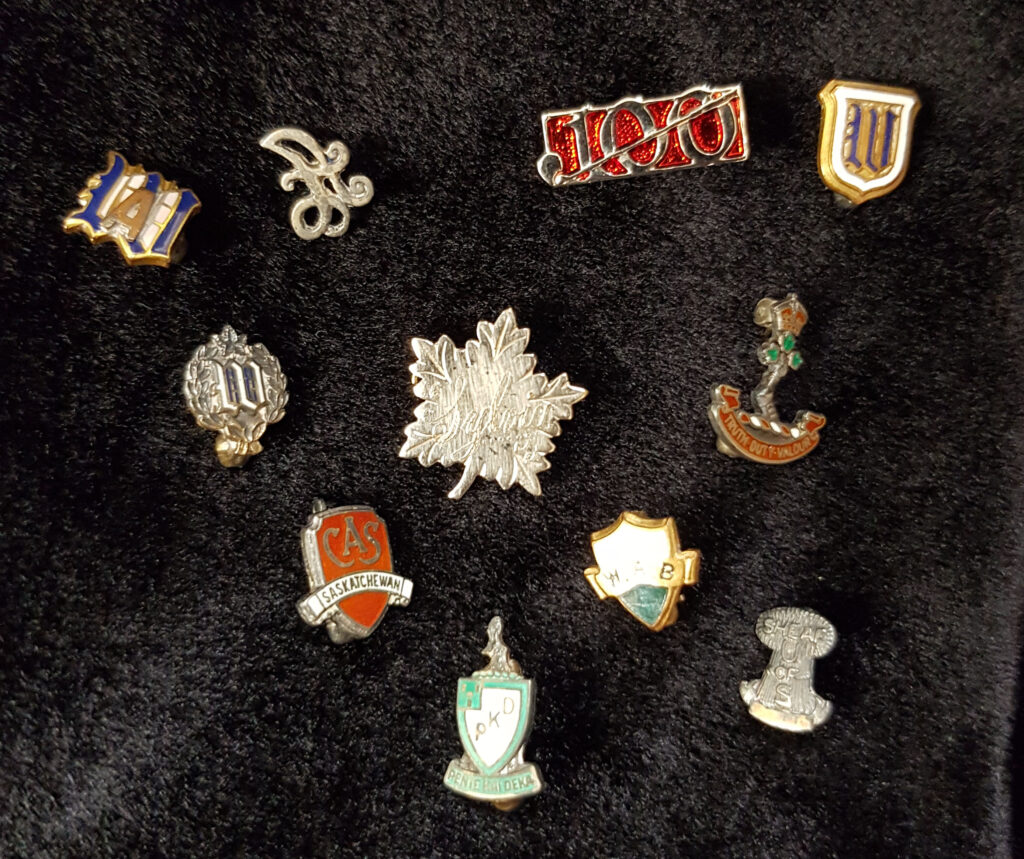

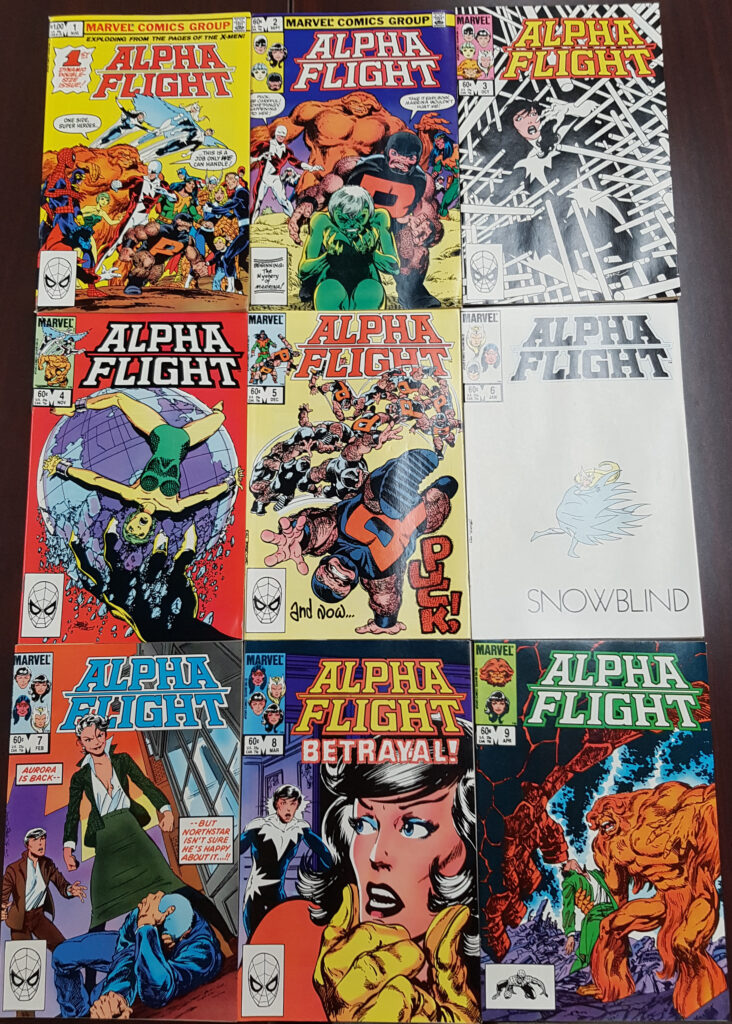






 What the finding aid says is that these were knit in 1987 with the wool from the family’s own flock of sheep. What do I say? ADORABLE. (MG 271 – Cooper, Hunter, and Anderson fonds)
What the finding aid says is that these were knit in 1987 with the wool from the family’s own flock of sheep. What do I say? ADORABLE. (MG 271 – Cooper, Hunter, and Anderson fonds)
























